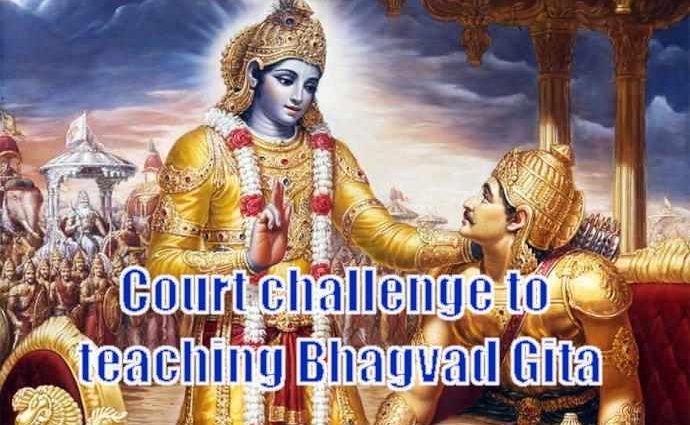A public interest litigation (PIL) petition challenging a decision by Gujarat’s Department of Education mandating the learning of Bhagavad Gita for students of classes 6 – 12 in the upcoming academic year has been filed in the state High Court.
The petition states that the decision was a “saffron” or colourable exercise of power.
March 17 announcement
It is interesting to note that the announcement was made by the Gujarat Education Minister Jitu Vaghani in the Assembly during the discussions on the budgetary allocations for the Education department on March 17.
It was also announced that English will be introduced from grade I from the next academic year.
The State government circular said the idea was to “cultivate a sense of pride and connection to traditions.”
“Shrimad Bhagavad Gita’s values, principles and importance are accepted by people of all religions. In class VI, Shrimad Bhagavad Gita will be introduced in such a way that students will develop an interest in it,” Mr. Vaghani said.
The idea behind the decision is to explain to the students the importance of the teachings of Bhagavad Gita explaining its slokas, sloka songs, essays, debates, plays, quizzes, etc.
Back then, the move by the State government found support from the opposition Congress and the Aam Aadmi Party.
The PIL claims in secular India it is against the constitution to impart religious education. The PIL claims the plan is violative of Articles 14 (right to equality) and other fundamental rights.
The PIL also uses Article 28(1) of the constitution of India which says “no religious instruction shall be provided in any educational institution wholly maintained out of State funds”.
Also read: Siddharth Verma – the man who took on Rahul Gandhi
But it ignores Article 28(3) which gives freedom to those who do not want to be part of religious instruction, to stay away without being punished for doing so. Article 28(3) of the constitution of India says:
No person attending any educational institution recognised by the State or receiving aid out of State funds shall be required to take part in any religious instruction that may be imparted in such institution or to attend any religious worship that may be conducted in such institution or in any premises attached thereto unless such person or, if such person is a minor, his guardian has given his consent thereto.
The Court has asked the state government to respond.
The court also refused to grant stay on the decision’s operation.
Some four months after the decision was announced (on March 17), the plea has been filed by Jamiat Ulama-e-Hind. It states:
“It is an undisputed fact that the Gita is a religious book of the Hindus and all the values enunciated in the Gita are interwoven with the tenets of Hinduism.”
Jamiat Ulama-e-Hind is concerned that educating students in only one religion would have the effect of indoctrinating young impressionable minds of the superiority of one religion over others.
The case has been listed for further hearing on August 18, 2022.
Similar Posts by The Author:
- Problems of Arvind Kejriwal lie in the Charge-sheet against Manish Sisodia
- ABC Ram Temple coverage: ABC Ombudsman’s “No Bias” report – a slap on the face of Australian Hindus
- Defamation dogfights are dogging the leader: Should John Pesutto step down to come back later?
- ASIO boss Mike Burgess MUST name the rogue politician, academics
- Who can stop John Pesutto from becoming Premier of Victoria?

